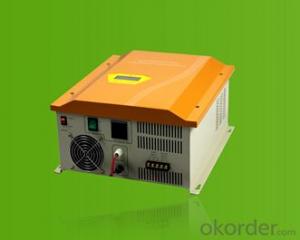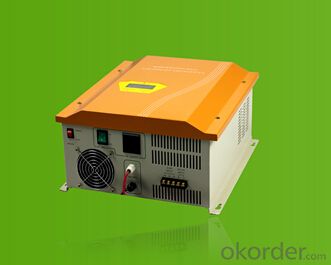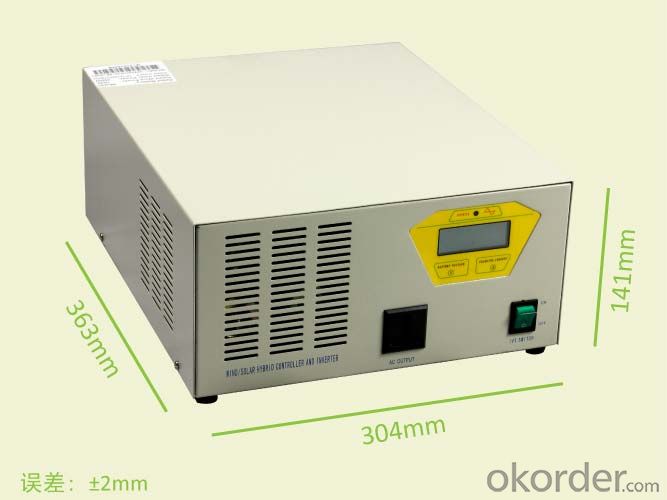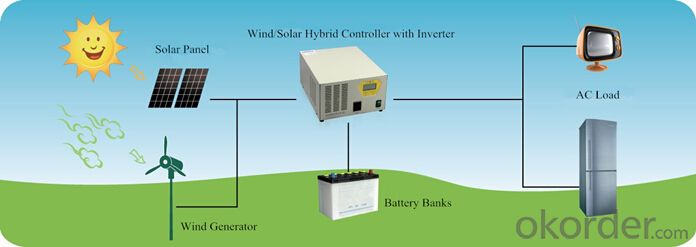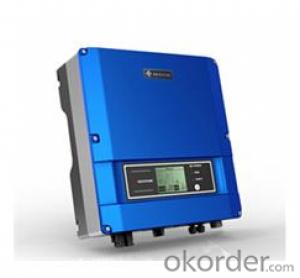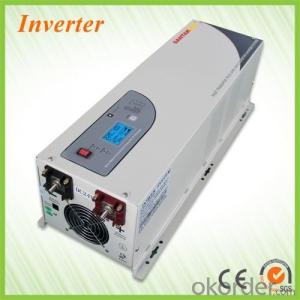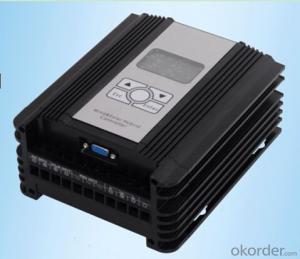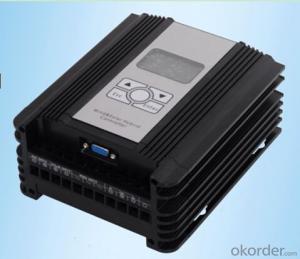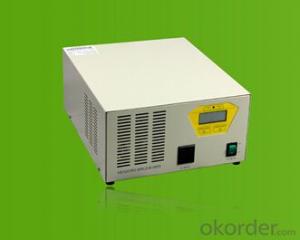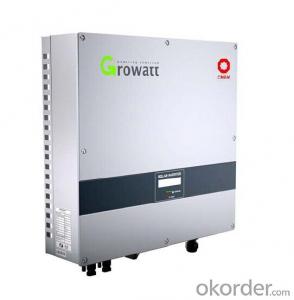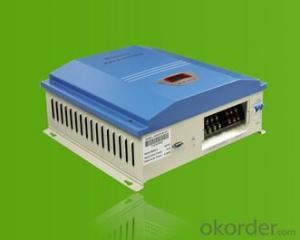Sunways Solar Inverter 1kw Wind Solar Hybrid Controller with Inverter
- Loading Port:
- Shanghai
- Payment Terms:
- TT or LC
- Min Order Qty:
- 1 unit
- Supply Capability:
- 5000 unit/month
OKorder Service Pledge
OKorder Financial Service
You Might Also Like
I. PRODUCT INTRODUCTION
Wind/solar hybrid controller with inverter is the intelligent power supply with integration of wind/solar control and DC to AC inverse.
The apparatus is mainly used for wind /solar renewable energy power system; provide effective power supply for traffic inconvenience, harsh environment of mountain area, a pasturing area, border, islands and other areas without electricity.
With decent appearance, easy operation, and visual indication of LCD, the controller has perfect protection function, high charging efficiency and low no-load loss.
II. PERFORMANCE FEATURES
Perfect protection function, thus the system has higher reliability.
LCD display function, visually display battery voltage and charge current.
Integrated design of controller and inverter, with simple and easy maintenance.
PWM stepless unload mode, which burn excess power into dump load, making the battery charging in the best status.
Power frequency toroidal transformer, ensures inverter has high efficiency and low no-load loss.
Pure sine wave output, compared with square wave or modified wave, has higher efficiency and higher capability of driving load.
Certificate for Invention Patent of wind/solar hybrid controller with inverter, European CE.
III. APPLICATION AREAS
Domestic household wind power and photovoltaic power system, wind power station and photovoltaic power station.
Coastal islands, remote mountainous, border posts for regions shortage of or without electricity.
Government demonstration projects, landscape lighting project.
Mobile communication base station, expressway and other non-residential regions.
IV. 600W-1KW TECHNICAL PARAMETERS
Product Mode | WWSI0606-24 | WWSI0610-24 | WWSI1010-48 |
Rated wind turbine power | 600 W | 600 W | 1000 W |
Rated solar panel power | 180 W | 180 W | 300 W |
Floating charging voltage | 29 V | 29 V | 58 V |
Dump load current | 25 A | 25 A | 21 A |
Rated inverter output capacity | 600 VA | 600 VA | 1000 VA |
Rated battery banks voltage | 24 V | 24 V | 48 V |
Over voltage shutoff | 34 V | 34 V | 68 V |
Over voltage recovery | 33 V | 33 V | 66 V |
Battery over-discharge shutoff | 21.6 V | 21.6 V | 43.2 V |
Battery over-discharge recovery | 24 V | 24 V | 48 V |
No-load loss current | ≤0.7 A | ≤0.7 A | ≤0.5 A |
Net weight | 13 kg | 16 kg | 16 kg |
dimension | 400×340×160 mm | ||
Output wave | pure sine wave | ||
Display mode | LCD | ||
Cooling | Fan | ||
Rated output power | 110/120/220/230/240 VAC | ||
Wave distortion | ≤4% | ||
Output frequency | 50/60±0.5 Hz | ||
Dynamic response | 5% | ||
Power factor | ≥0.8 | ||
Over-load capacity | 120% 1min, 150% 10s | ||
Inverter efficiency | 90% Maximum | ||
Isolating mode | frequency toroidal transformer | ||
Protection level | IP20(Indoor) | ||
Noise (1 meter) | ≤40dB | ||
Insulating strength | 1500VAC, 1min | ||
Protection functions | Battery over-charge protection; battery over-discharge protection; battery reverse connection protection; output overload protection; output short circuit protection; overheating protection; solar reverse charge protection; solar reverse connection protection; automatic brake and manual brake protection; lighting protection | ||
Working temperature | -20~+55℃ | ||
Ambient humidity | 0~93%, without condensing | ||
Working altitude | ≤4000m | ||
In order to serve our customers better. Our company can adjust parameters configuration according to customer’s requirement. | |||
V. APPENDIX
Optional Functions | |
Ø By-pass function: It will switch to the city grid automatically when the battery is under voltage, which ensures the continuity and stability of system. | Ø English display |
Friendly reminder: users should offer following information when ordering wind/solar hybrid controller with inverter | |
Ø Rated battery voltage | Ø Rated wind turbine power |
Ø Rated solar panel power | Ø Load peak power and load characteristics |
Ø With or without by-pass function | Ø Inverter output capacity, rated output voltage and rated output frequency |
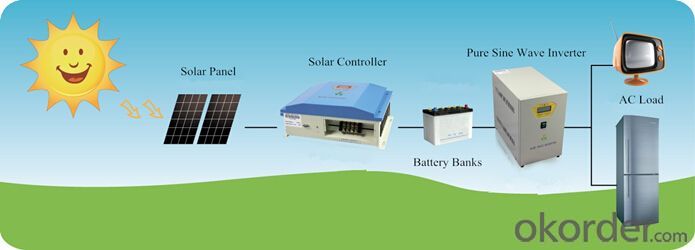
- Q: How does a solar inverter handle harmonics in the grid?
- A solar inverter handles harmonics in the grid by implementing various techniques such as filtering, synchronization, and control algorithms. These techniques help in mitigating harmonics and ensuring that the power generated from the solar panels is synchronized and compatible with the grid's electrical frequency and voltage. The inverter's control system monitors the grid's harmonics and adjusts its output accordingly to minimize any adverse effects and maintain grid stability.
- Q: Can a solar inverter be used with a solar-powered street lighting system?
- Yes, a solar inverter can be used with a solar-powered street lighting system. A solar inverter is responsible for converting the direct current (DC) produced by solar panels into alternating current (AC) that can be used to power electrical devices. In the case of a solar-powered street lighting system, the solar inverter can convert the DC power generated by the solar panels into AC power to operate the street lights. This allows the system to efficiently utilize the energy generated by the sun and provide reliable lighting for the streets.
- Q: What is the role of a synchronization circuit in a solar inverter?
- The role of a synchronization circuit in a solar inverter is to ensure that the inverter's output voltage and frequency are synchronized with the utility grid. This is important for two reasons. Firstly, it allows the solar inverter to safely connect and disconnect from the grid, ensuring smooth and seamless operation. Secondly, it enables the solar inverter to inject electricity generated from solar panels into the grid at the correct voltage and frequency, making it compatible with other electrical devices and systems connected to the grid.
- Q: Can a solar inverter be used in a multi-string configuration?
- Yes, a solar inverter can be used in a multi-string configuration. In fact, many solar installations utilize multiple strings of solar panels connected to a single inverter. This allows for increased efficiency, flexibility, and the ability to harvest more energy from the sun.
- Q: After the PV inverter, how to achieve the same period before the network?
- When the voltage, frequency, phase does not meet the requirements, the automatic closing closing pulse.
- Q: How does a solar inverter ensure safety during maintenance?
- A solar inverter ensures safety during maintenance by automatically disconnecting the system from the grid and de-energizing the circuits. This prevents any potential electrical shocks or accidents while the maintenance personnel work on the system.
- Q: What are the key safety features to look for in a solar inverter?
- The key safety features to look for in a solar inverter include: 1. Overvoltage and undervoltage protection: This feature ensures that the inverter can handle voltage fluctuations and prevents damage to the electrical system. 2. Ground fault protection: It is essential for the inverter to have ground fault protection to prevent electric shocks and ensure the safety of the system. 3. Anti-islanding protection: This feature ensures that the solar inverter shuts down in the event of a power outage, preventing it from sending power back to the grid and endangering utility workers. 4. Overtemperature protection: A reliable solar inverter should have overtemperature protection to prevent overheating and potential fire hazards. 5. Surge protection: The inverter should have built-in surge protection to safeguard against power surges caused by lightning strikes or grid fluctuations. 6. Arc fault protection: This safety feature detects and mitigates the risk of arc faults, which can result in electrical fires, by rapidly shutting down the inverter. 7. Monitoring and fault detection: A good solar inverter should have a monitoring system that detects faults or abnormalities in real-time, allowing for prompt maintenance and troubleshooting. 8. Compliance with safety standards: Ensure that the solar inverter complies with relevant safety standards, such as UL (Underwriters Laboratories) or IEC (International Electrotechnical Commission), to guarantee its safety and reliability. By considering these key safety features, you can ensure the overall safety and performance of your solar inverter system.
- Q: What is the role of a DC-DC converter in a solar inverter?
- The role of a DC-DC converter in a solar inverter is to convert the direct current (DC) power produced by the solar panels into the appropriate voltage and current levels required to feed into the alternating current (AC) grid. This conversion ensures efficient power transfer from the solar panels to the electrical grid, enabling the solar energy to be used for various applications or to be stored in batteries.
- Q: How does a solar inverter handle sudden changes in solar irradiance?
- A solar inverter handles sudden changes in solar irradiance by continuously monitoring the amount of solar energy being generated. When it detects a sudden change in solar irradiance, the inverter adjusts its internal settings accordingly to maintain a stable output voltage and frequency. This allows it to effectively handle fluctuations in solar power input and ensure a consistent and reliable flow of electricity to the connected loads or the grid.
- Q: How does a solar inverter protect against voltage fluctuations?
- A solar inverter protects against voltage fluctuations by continuously monitoring the voltage levels from the solar panels. It adjusts the voltage to match the grid voltage, ensuring a stable and consistent flow of electricity. Additionally, it employs various protective mechanisms such as overvoltage or undervoltage protection, surge protection, and fault detection to safeguard the system from voltage fluctuations and potential damage.
Send your message to us
Sunways Solar Inverter 1kw Wind Solar Hybrid Controller with Inverter
- Loading Port:
- Shanghai
- Payment Terms:
- TT or LC
- Min Order Qty:
- 1 unit
- Supply Capability:
- 5000 unit/month
OKorder Service Pledge
OKorder Financial Service
Similar products
Hot products
Hot Searches
Related keywords
